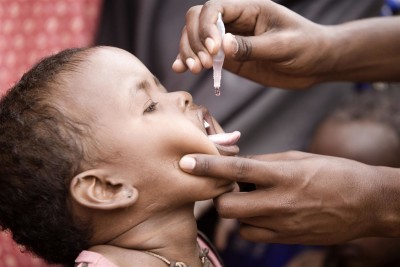
…with this newfound commitment to accurate data, our chances of succeeding have never been greater. Why? Because accurate data can completely change how we deliver vaccines. More detailed data can help identify patterns and give us new insights into why these gaps persist – opening the door to new solutions.
A picture is worth a thousand words, they say, but numbers can speak volumes. And this year, when the World Health Organisation (WHO) and UNICEF released their report on global immunisation coverage, those numbers revealed many volumes. For me, the standout figure was that 1 in 10 infants worldwide did not receive any vaccinations in 2016. This shows us that we still have a very long way to go to reach every child.
But numbers must be accurate to influence change, which is why, as a Nigerian, I’ve often received Nigeria’s immunisation coverage numbers with some concern. The figures seemed to be showing progress in coverage but the reality on the ground was often very different. It felt as if our country’s numbers were not revealing an accurate picture of people’s lives.
Too often there was a large discrepancy between Nigeria’s administrative and survey coverage data. Administrative data is the product of health centres reporting on the number of vaccines given to patients, whereas survey data relies on evaluators going into communities and confirming if people were immunised. Survey data is often much lower than administrative data – a problem not unique to Nigeria.
This year, however, Nigeria’s immunisation coverage estimates blew me away and made me proud for a very surprising reason.
Nigeria’s government revised its annual coverage estimates for the number of children completing the three-dose diphtheria-tetanus-pertussis (DTP3) vaccine reported to the WHO and UNICEF to be 45 percent, a number in line with preliminary data from a recent national survey. This is in contrast to previous estimates of nationally reported coverage levels that put government estimates of coverage at over 85 percent during the last couple of years.
This revision is due to the Nigerian government’s decision to let the numbers – and the people behind the numbers – do the talking. Despite the political risks, Nigeria demonstrated its bravery by side-lining its inflated administrative data in favour of its survey data. This new benchmark has finally revealed the reality of Nigeria’s immunisation coverage.
It is about giving Nigeria’s children a voice and ensuring the reality of their lives is reflected in our numbers. After all, the impact of immunisation for our country can also be reflected in numbers. For every $1 invested in immunisation in Africa, $41 is produced in economic and social benefits.
Yes, immunisation coverage in the 40 percent range is dreadfully low, but it is tremendous to see my home country being open and transparent about the challenges that exist in its recording and reporting system and the impacts on producing accurate immunisation data. We wish more countries showed this courage as only then can we use data to increase the number of children protected by vaccines.
A few weeks before the publication of the WHO and UNICEF’s report on the global immunisation coverage, Nigeria was already demonstrating its commitment to tackling the problem. In June, the National Primary Health Care Development Agency (NPHCDA) declared a state of emergency on routine immunisation to save the lives of more Nigerian children from vaccine-preventable diseases like polio, tetanus and pertussis.
The NPHCDA has set itself an ambitious target to improve immunisation and revitalise primary health care services within two years. This target is only made more ambitious by Nigeria’s unique administrative and security challenges. It will be no easy feat to address the data challenge and it will require a significant level of commitment – from the highest levels of leadership to frontline health workers. Everyone must redouble their efforts like never before.
foraminifera
But, with this newfound commitment to accurate data, our chances of succeeding have never been greater. Why? Because accurate data can completely change how we deliver vaccines. More detailed data can help identify patterns and give us new insights into why these gaps persist – opening the door to new solutions.
In just the last two weeks, Bill Gates and Aliko Dangote took part in video conferences with governors of six states – Bauchi, Borno, Sokoto, Kano, Kaduna and Yobe – which have all declared their commitment to improving routine immunisation and child health. These video conferences reviewed the successes and challenges facing the states as they strive to improve routine immunisation coverage. Knowledge-sharing and accurate data at the district level hold the keys to identifying where the most vulnerable children are, and how best to reach them.
Next year, I won’t be awaiting Nigeria’s immunisation coverage numbers with such concern. Instead, I’ll be waiting with hope. To me, the data revision is more than a change in numbers. It is about giving Nigeria’s children a voice and ensuring the reality of their lives is reflected in our numbers. After all, the impact of immunisation for our country can also be reflected in numbers. For every $1 invested in immunisation in Africa, $41 is produced in economic and social benefits. Numbers can only speak volumes when they are accurate and now, Nigeria is speaking louder than ever.
Ayo Ajayi is director of the Africa Team, leading the Bill & Melinda Gates Foundation’s work on policy, advocacy, and government relations across the continent, as well as its offices in Ethiopia, South Africa, and Nigeria.
Image credit: pulse.ng.
END

Be the first to comment